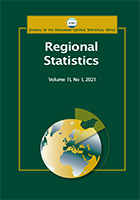Comparison of SARFIMA and LSTM methods to model and to forecast Canadian temperature
Comparison of SARFIMA and LSTM methods to model and to forecast Canadian temperature
Author(s): Sami KhedhiriSubject(s): Social Sciences, Economy, Geography, Regional studies
Published by: Központi Statisztikai Hivatal
Keywords: SARFIMA; long short-term memory; root-mean-square error; temperature prediction
Summary/Abstract: An empirical study is performed using seasonal autoregressive fractionally integrated moving average (SARFIMA) time series models and long short-term memory (LSTM) methods from deep learning to evaluate their statistical performance for the fit and prediction of temperature variables. These two methods are applied to monthly minimum and maximum air temperature data collected from four Canadian stations, covering the eastern, western, and central regions of Canada. It is a generally accepted fact that accurate temperature forecasting is important to everyone and stakeholders in several economic activities including the tourism, agriculture, and energy sectors rely on this information. Therefore, it is crucial to select the best methods which provide appropriate statistical modelling and an accurate prediction of temperature. The results of this study show that deep learning LSTM models have betterfit and smaller root-mean-square errors compared to time series SARFIMA models.
Journal: Regional Statistics
- Issue Year: 12/2022
- Issue No: 02
- Page Range: 177-194
- Page Count: 18
- Language: English

